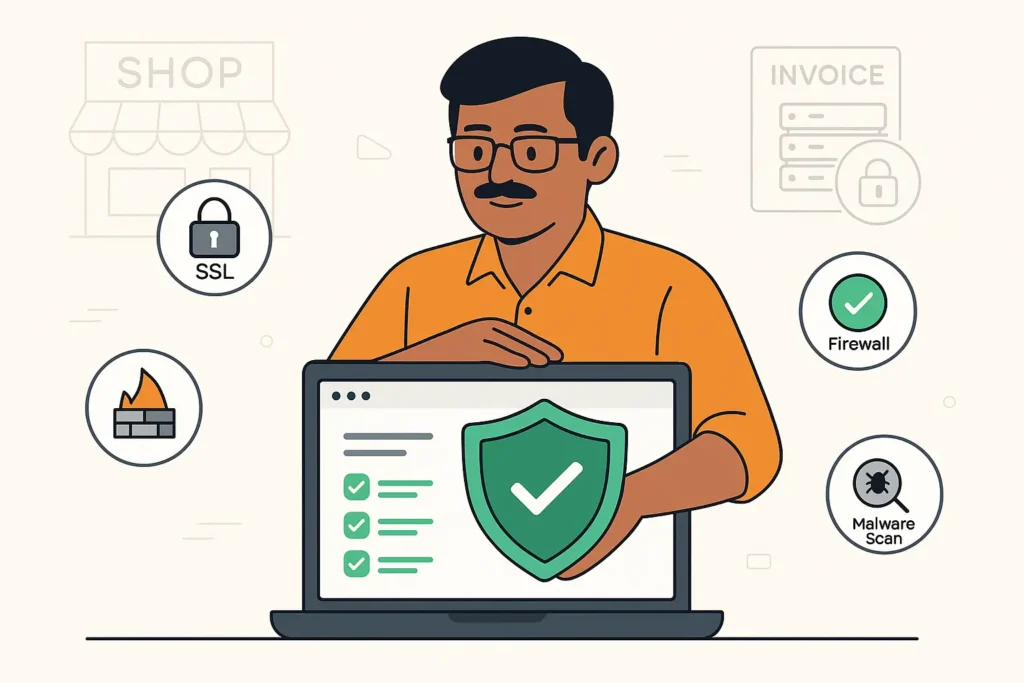In 2025, website security for small businesses in India is a critical factor that can make or break your business. From protecting customer data to avoiding financial loss and SEO penalties, small business owners can no longer afford to ignore online security. Cybercriminals increasingly target Indian SMEs due to weaker defenses and high vulnerability rates.
At Right Web Solution, we’ve helped 100+ small businesses across India secure their websites and avoid costly breaches. This in-depth guide provides a practical and powerful 2025 website security checklist for small businesses in India. Follow it to protect your brand, boost customer trust, and meet compliance standards.
Related Services: Learn more about our Website Development Services and Cybersecurity Solutions.
Table of Contents
- Why Website Security Matters in 2025
- 2025 Website Security Checklist
- Best Website Security Tools
- Real-World Indian SME Breaches
- Free vs Paid Security Tools
- Common Mistakes to Avoid
- Why Indian SMEs Delay Security
- SEO Benefits of Website Security
- FAQs
- Free Consultation – Get Secured Today
Why Website Security Matters in 2025
Indian small businesses are facing increasing cybersecurity threats. A 2024 report by CERT-In revealed that over 40% of cyber incidents in India involved SMEs. These attacks include ransomware, phishing, SQL injections, and brute-force login attempts.
Without strong website security for small businesses in India, consequences may include:
- Loss of sensitive customer or financial data
- Google blacklisting and SEO ranking drops
- Ransomware demands and reputational harm
- Legal penalties due to non-compliance
That’s why investing in proper website security for small businesses in India is not a luxury, but a necessity.

✅ 2025 Website Security Checklist
Here’s a comprehensive security checklist tailored for Indian small businesses in 2025:
1. Install an SSL Certificate
SSL is mandatory. Google flags non-HTTPS sites as “Not Secure.” Install a trusted SSL certificate to encrypt all communication. Affordable SSLs available here.
2. Choose Secure Hosting
Select a provider offering DDoS protection, daily backups, and malware protection. Explore our Linux/Windows hosting plans.
3. Update CMS, Plugins & Themes
According to Sucuri, 61% of hacked sites had outdated components. Set auto-updates where possible.
4. Enforce Strong Login Practices
Use 2FA, unique usernames, and limit login attempts. Avoid “admin” as the default user.
5. Add Web Application Firewall (WAF)
WAFs like Cloudflare and Sucuri block malicious traffic.
6. Install a Malware Scanner
Use plugins like MalCare, Wordfence, or Jetpack to automatically scan files for malware or file injections.
7. Protect All Forms
Use Google reCAPTCHA, sanitize inputs, and validate entries. Learn about SQL injection risks here.
8. Perform Regular Backups
Automate backups to Google Drive, Dropbox, or S3 using tools like UpdraftPlus or Jetpack.
9. Enable User Role Restrictions
Assign access based on need-to-know. Remove unused accounts regularly.
10. Monitor Site Activity
Use UptimeRobot, Jetpack, or Site24x7 to track unauthorized file changes, uptime, or login attempts.
🔧 Best Website Security Tools
- MalCare – Best for automatic malware removal
- Wordfence – Great for login security & scans
- Cloudflare – DNS-level firewall & DDoS protection
- UpdraftPlus – Easy and reliable WordPress backups
- Jetpack Security – Multi-feature security suite
📉 Real-World Indian SME Breaches
✔️ A Jaipur travel agency’s WordPress site was hacked due to an outdated plugin. It led to 8 days of downtime and client loss.
✔️ An Ahmedabad textile firm lost access to email data after a ransomware attack spread through their unsecured hosting panel.
✔️ A coaching center in Pune faced legal issues after customer records were leaked from their unsecured contact form.
All could have been prevented with basic website security for small businesses in India.
💡 Free vs Paid Website Security Tools
| Tool | Free? | Best For | Cost (Year) |
|---|---|---|---|
| MalCare | ✅ | Malware auto-clean + alerts | ₹4,200 |
| Wordfence | ✅ | Login firewall & scan | ₹6,500 |
| Cloudflare | ✅ | Firewall, CDN, DDoS | ₹0 – ₹8,000 |
| Jetpack | ✅ | Backup + scan + monitor | ₹5,000 |
🚫 Common Mistakes to Avoid
- ❌ Using outdated CMS, plugins, or themes
- ❌ Ignoring SSL renewal or using free unverified certificates
- ❌ No malware scanner installed
- ❌ Public admin URL with weak login protection
- ❌ Not investing in any website security for small businesses in India
🧠 Why Indian SMEs Delay Website Security (and the Cost They Pay)
Many Indian small businesses delay investing in website security due to budget limitations, lack of technical awareness, or the false belief that “my business is too small to be hacked.” Unfortunately, this mindset has led to thousands of breaches across small firms, startups, and even independent professionals.
The truth is that automated bots do not discriminate. Whether you’re a five-page portfolio website or a growing e-commerce store, your digital doors can be knocked on 24/7 by bad actors. That’s why proactive website security for small businesses in India should never be considered optional or postponed.
Delays often lead to higher recovery costs, loss of SEO rankings, customer trust issues, and penalties from Google or industry regulators.
📈 SEO Benefits of Website Security for Small Businesses in India
Aside from technical protection, website security for small businesses in India directly impacts your search engine visibility. Google has publicly confirmed that HTTPS is a ranking factor, and unsecured websites are often flagged in search results.
When your website is secure, it loads faster, builds trust with visitors, and avoids common SEO pitfalls like malware warnings or redirection issues. Secure sites also perform better with Google Ads and in page experience metrics like Core Web Vitals.
If you’re investing in SEO and content marketing, ignoring website security can quietly sabotage your efforts. Search engines prioritize safe websites—period.
❓ FAQs – Website Security for Small Businesses in India
1. Why is website security important for Indian SMEs?
SMEs are high-risk targets due to minimal protection. One breach can destroy trust, data, and rankings.
2. How much does basic website security cost in India?
Between ₹2,000 and ₹6,000/year depending on tools and hosting quality.
3. Can Google penalize insecure websites?
Yes. HTTP-only sites may be flagged as unsafe and drop in search rankings.
4. Can I manage security without hiring developers?
Absolutely. Plugins like MalCare and Jetpack are DIY-friendly with auto-protection features.
5. What’s the first step to securing my SME site?
Install SSL, scan for malware, enable a firewall, and back up your website regularly.
🚀 Secure Your Website with Right Web Solution
We specialize in website security for small businesses in India. Our ₹4,999 flat-rate SME Security Package includes:
- ✅ SSL Installation & Hosting Hardening
- ✅ Plugin Audit & Malware Removal
- ✅ Backup Configuration & Admin Lockdown
🆓 Book your FREE 30-minute consultation now. No obligation to develop with us!
📞 Call: +91 8850 907518
📩 Email: hello@rightwebsolution.com
🌐 Website: https://rightwebsolution.com










1 Comment
Proven Website Security for Small Businesses in India – 2025 Checklist
August 14, 2025[…] Website Security Essentials for Small Businesses in India — 2025 Checklist […]